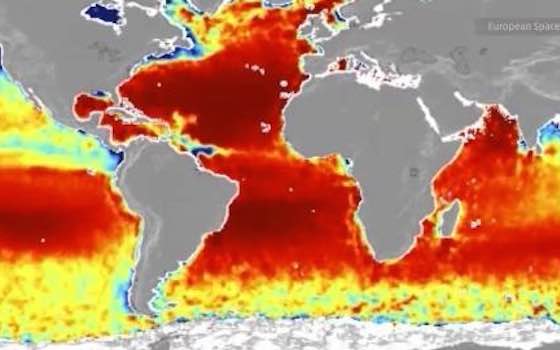- MENU
- HOME
- SEARCH
- WORLD
- MAIN
- AFRICA
- ASIA
- BALKANS
- EUROPE
- LATIN AMERICA
- MIDDLE EAST
- United Kingdom
- United States
- Argentina
- Australia
- Austria
- Benelux
- Brazil
- Canada
- China
- France
- Germany
- Greece
- Hungary
- India
- Indonesia
- Ireland
- Israel
- Italy
- Japan
- Korea
- Mexico
- New Zealand
- Pakistan
- Philippines
- Poland
- Russia
- South Africa
- Spain
- Taiwan
- Turkey
- USA
- BUSINESS
- WEALTH
- STOCKS
- TECH
- HEALTH
- LIFESTYLE
- ENTERTAINMENT
- SPORTS
- RSS
- iHaveNet.com: Environment

Each year, more than a quarter of the world's carbon dioxide emissions are absorbed by the oceans. That could be a good thing, except all that CO2 actually alters ocean chemistry, making it more acidic.
The ocean is becoming more acidic primarily due to the increased concentration of carbon dioxide (CO2) in the atmosphere, resulting from human activities, particularly the burning of fossil fuels. Here's how it happens:
Carbon Dioxide Absorption
When CO2 is released into the atmosphere from activities such as burning coal, oil, and gas, a portion of it is absorbed by the ocean's surface. This process is known as oceanic uptake or carbon sequestration.
Carbonic Acid Formation
When CO2 dissolves in seawater, it reacts with water molecules to form carbonic acid. This reaction increases the concentration of hydrogen ions (H+), reducing the pH of seawater and making it more acidic.
Impact on Marine Chemistry
The increase in ocean acidity affects the carbonate chemistry of seawater. Carbonate ions (CO32-) are essential building blocks for marine organisms to form shells, skeletons, and coral reefs. As seawater becomes more acidic, carbonate ions become less available, making it more challenging for marine organisms to produce and maintain their calcium carbonate structures.
The consequences of ocean acidification are concerning:
Coral Reefs
Coral reefs, home to a diverse array of marine life, are particularly vulnerable to ocean acidification. Higher acidity levels make it harder for corals to build and maintain their calcium carbonate structures, leading to coral bleaching and reef degradation.
Shellfish and Marine Life
Many shell-forming organisms, including oysters, clams, mussels, and some planktonic species, are also affected by ocean acidification. Acidic waters can inhibit their ability to build and repair shells, impacting their survival and the entire marine food web.
Ecosystem Disruption
Ocean acidification can disrupt the balance of marine ecosystems, affecting the growth and development of various species. Changes in species abundance and distribution can have cascading effects on entire food chains and ecosystems.
Addressing ocean acidification requires reducing CO2 emissions and mitigating the causes of climate change. This can involve transitioning to cleaner energy sources, increasing energy efficiency, and implementing sustainable practices to reduce carbon emissions. Additionally, protecting and restoring coastal habitats, such as mangroves and seagrass meadows, can help buffer the impacts of acidification and promote the resilience of marine ecosystems.
More Environment & Climate Change ...
- 5 Radical Takeaways from the Pope's Letter on Climate
- A Green-Energy Founding Father
- We're All Taking Dirty Pictures
- Faking It While the World Burns
- This Oil Spill Hits Close to Home
- A Fossil-Fueled Fantasy
- The Pentagon Makes War on Alaska's Pristine Wilderness
- Climate Denial Syndrome Sweeps Wisconsin
- How Climate Change and Resource Scarcity Are Upending World Politics
- Virginia Is for Dirty-Energy Lovers
- Humanity's War on Wildlife
- Making Green Cool Again in Hungary
- David and Goliath in the Amazon
- NASA Warns of 'Megadroughts'
- Our Growing Carbon Emissions
- Global Warming Triggered Syria War
- Round-the-World Solar Flight Takes Off
- 10 Extreme Weather Facts
- New York City Sea Level Rises
- Alaskan Glaciers Disappearing
- Leather Sludge New Bio-Fuel Source
- Why the Ocean is Turning More Acidic
- Why Whales Beach Themselves
- Termites Fight Climate Change
- Gas-Guzzlers On Road To Extinction
- Technology & Transformation
- Ecuador: All You Need Is Love and Oil?
- China Pulls Critical Pollution Documentary Offline
- Forging Our Future
- Green Believers
- The Glaciers Are Talking to Us
- Bald Eagles Nesting In New York City For First Time In 100 Years
- Asian Pollution Messing With U.S. Weather
- Instagram Account Shows Reality of Climate Change
- Keystone Pipeline Would Emit Tons of Greenhouse Gases
- Why You Can't Throw Away Batteries
- Road Salt Is Worse Than You Think
- Arctic Not Cold Enough for Polar Bears
- Doomsday Clock & Climate Change
- Sea-Level Accelerating Faster Than Previously Thought
- 6 Countries Dictate Planet's Future
- Manhattan Size Glacier Breaks Apart
- Opinions Split on Fracking Benefits
- Bad News for Sea Level Rise
- 2014 Hottest Year On Record According To NASA
- While Our Planet Melts, GOP Pleads Ignorance
- The Myth of the Wild
- Plastic Bags are Not a Need - Just a Bad Habit
- Environmental Security: Conflict or Cooperation?
- Beyond The Water-Food-Energy-Climate Nexus
- Climate Change Report Sounds Alarm for Planet Earth
- Genesis, Mother Nature and Environmental Stewardship
- Global Climate Change: Calling All Pagans
- Chicken Little 'Science'
- Climate Change and Interstate Conflict
- Fracking: A Deadly Power Surge
- Inhospitable Earth -- Compared to What?
More Environment & Climate Change ...
"Why Is the Ocean Becoming More Acidic? "